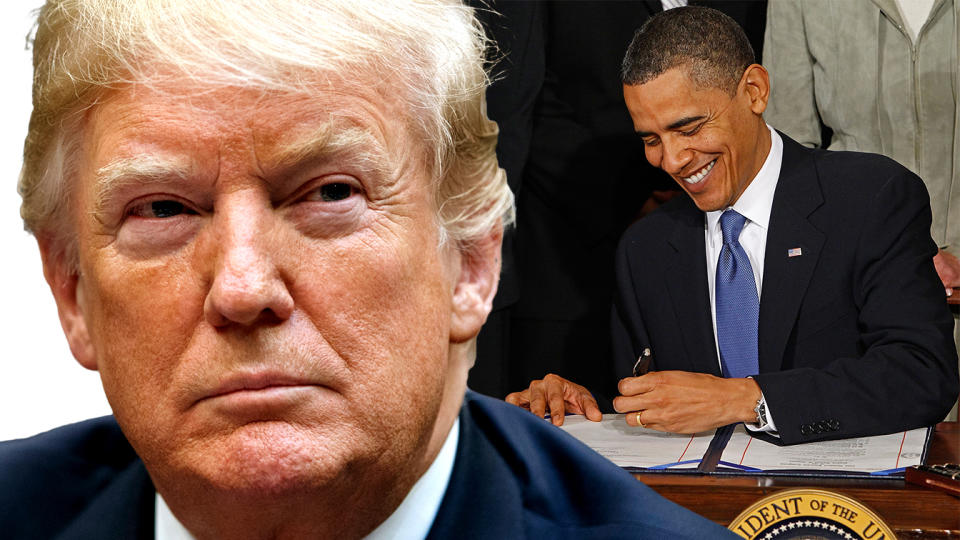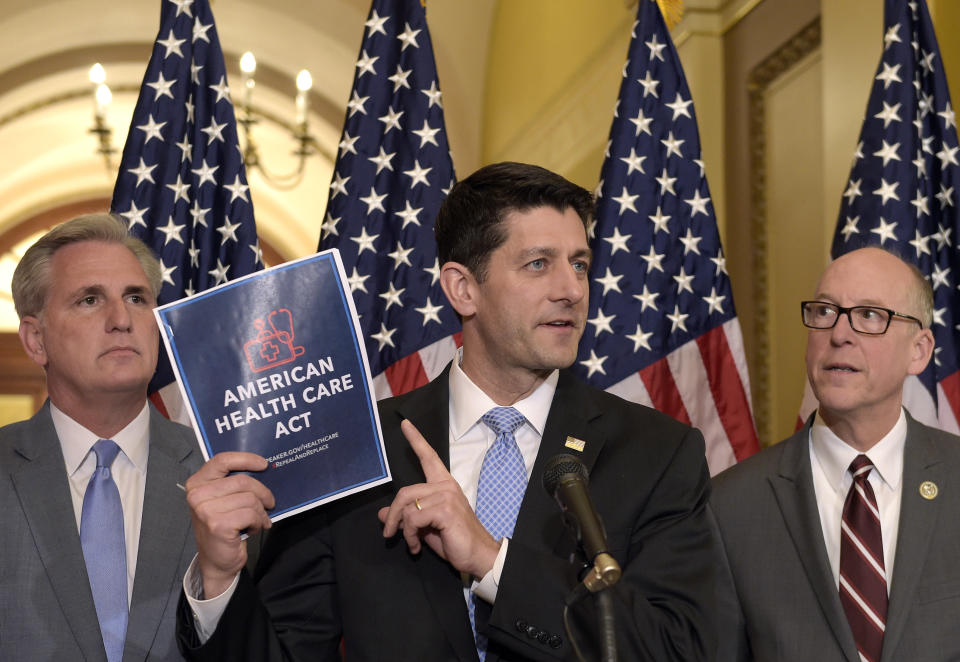In face of pandemic, Trump pushes Obamacare repeal
The Trump administration, pursuing the president’s long-standing ambition to undo former President Barack Obama’s signature achievement, filed a brief at the Supreme Court Thursday night seeking a ruling that would eliminate the entire Affordable Care Act, even as the number of Americans needing medical care for the coronavirus has been rising.
It’s unclear what health-insurance plan, if any, President Trump would seek to implement if the court challenge succeeds.
In the administration’s brief, the Justice Department argued that the Affordable Care Act, or Obamacare, became invalid in 2017 when Republicans in Congress eliminated the individual mandate for uninsured people. The case, which Trump announced his intention to push in May, is backed by 20 Republican-led states.
“No further analysis is necessary; once the individual mandate and the guaranteed-issue and community-rating provisions are invalidated, the remainder of the ACA cannot survive,” wrote Solicitor General Noel Francisco in the filing.
Twenty Democratic-led states and House Democrats are leading the defense of the law.
“The ACA has been life-changing, and now through this pandemic we can all see the value in having greater access to quality health care at affordable prices," said California Attorney General Xavier Becerra earlier Thursday. “Now is not the time to rip away our best tool to address very real and very deadly health disparities in our communities.”
“President Trump and the Republicans’ campaign to rip away the protections and benefits of the Affordable Care Act in the middle of the coronavirus crisis is an act of unfathomable cruelty,” said House Speaker Nancy Pelosi in a statement Thursday. In advance of the Trump administration’s planned filing, House Democrats introduced a plan Wednesday that would lower health care costs for Americans just above the poverty line by further limiting premiums.

The Supreme Court could hear oral arguments as soon as October after denying a motion earlier this year that would have accelerated the case. The five justices who upheld the health care legislation in 2012 — Chief Justice John Roberts and four Democratic appointees — remain on the court, and even opponents of the ACA, like the Wall Street Journal editorial board, think this attempt to eliminate the law will likely fail.
The administration’s filing comes amid a pandemic that has killed more than 124,000 Americans and is still infecting record numbers daily in some states. Former Vice President Joe Biden, Trump’s presumptive opponent in November’s general election, has been attacking the administration for its COVID-19 response and its attempts to repeal the ACA.
Americans “would live their lives caught in a vise between Donald Trump’s twin legacies: his failure to protect the American people from the coronavirus, and his heartless crusade to take health care protections away from American families,” Biden said during a campaign event Thursday.
Health care was a top issue for Democrats in 2018 when they retook the House in the midterm elections, and party leadership has been eager to engage on the topic again ahead of November. Attorney General William Barr was reportedly among those who urged Trump not to push for a full repeal. A Fox News poll released earlier this month found 56 percent support for Obamacare, a record high and up 4 percent from last summer.
The Justice Department’s brief includes a section specifically arguing that the ACA’s protections for those with preexisting conditions must be overturned as well, contradicting Trump’s public statement that he and Republicans supported maintaining them. Without protections for preexisting conditions provided by Obamacare, the Kaiser Family Foundation estimated in 2016 that up to 52 million people could be denied coverage. Others would lose insurance if the Medicaid expansion that was adopted by dozens of states and D.C. is killed.
Since the start of his presidential campaign Trump has promised a health care plan that would be cheap and also provide coverage for everyone. In April 2019, he said in a tweet that “Republicans are developing a really great HealthCare Plan with far lower premiums (cost) & deductibles than ObamaCare. In other words it will be far less expensive & much more usable than ObamaCare.” In June 2019, he said he would be introducing a “phenomenal” plan that would “be less expensive than Obamacare by a lot” and that he’d be presenting that proposal “in about two months. Maybe less.”
So far no bill has emerged, while Trump continues to echo promises from 2015 of a plan to cover everyone at a lower cost without cuts to Medicare or Medicaid.
“What we want to do is terminate it and give health care,” Trump said last month discussing the attempt to overturn the ACA in court. “We’ll have great health care, including preexisting conditions.”

Republicans insist they want to pass a plan that requires insurers to offer coverage for preexisting conditions, but analysts consider that meaningless without a mechanism to control or subsidize premiums. Insurers will not, on their own, cover people with predictable medical expenses at a price that guarantees they will lose money. That was the problem the ACA sought to address with its controversial individual mandate, which was meant to spread the cost of insurance over a broader base that would include healthy people. That mandate was repealed in the 2017 Republican tax bill.
In the first two years of Trump’s term, the GOP had control of both houses of Congress and made a sustained effort to replace Obamacare with a new plan. The Congressional Budget Office found in March 2017 that the American Health Care Act (AHCA), the Republicans’ proposed replacement, would knock 14 million people off insurance in one year and 24 million more by 2026, while the AARP estimated it would raise health care costs for older Americans by thousands of dollars. The Republican House passed an amended version of the AHCA in May 2017, leading to a Rose Garden celebration with Trump and then-House Speaker Paul Ryan, but it died in the Senate. The legislation would have slashed Medicaid for low-income Americans, despite Trump’s repeated promises to the contrary.
The July 2017 “skinny repeal” vote that barely failed in the Senate following “no” votes from Republican Sens. Susan Collins, Lisa Murkowski and John McCain was estimated by the CBO to increase by 16 million the number of uninsured Americans by 2026 and bring about a 20 percent rise in premiums. Actuaries calculated that thousands more Americans would have died sooner if the Obamacare replacements had passed.
Early in his presidency, Trump was surprised by the complexities of attempting to overhaul a massive industry Americans use to stay alive.
“Now, I have to tell you, it’s an unbelievably complex subject,” he said in February 2017. “Nobody knew health care could be so complicated.”
_____
Read more from Yahoo News:


